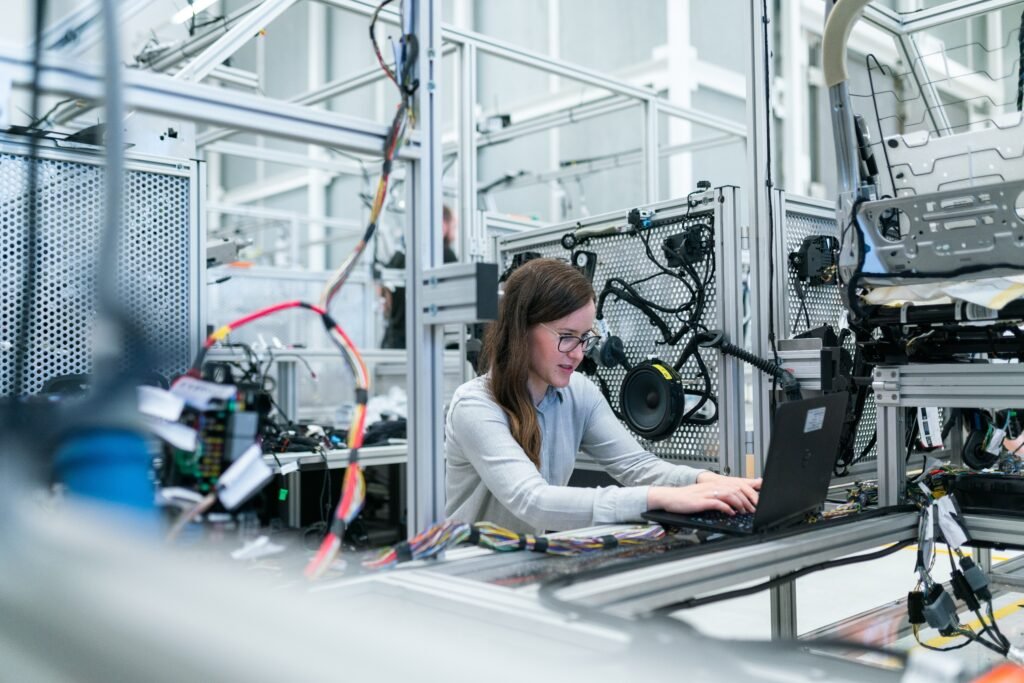Artificial intelligence (AI) has come a long way since its inception in the 1950s, and it is now reshaping societies and economies in profound ways. The potential of AI to improve productivity, address global challenges, and enhance well-being is remarkable. However, as AI becomes more prevalent, it also raises important ethical and policy considerations. Questions around fairness, privacy, accountability, and human values need to be addressed. In order to foster a shared understanding of AI and guide policy discussions, the OECD has released a comprehensive report that maps the AI landscape and highlights key considerations. This report aims to facilitate coordination and consistency across national and international discussions on AI.
Background
Introduction to Artificial Intelligence
Artificial Intelligence (AI) refers to the development of computer systems that can perform tasks that typically require human intelligence, such as speech recognition, problem-solving, and decision-making. AI encompasses a wide range of technologies and algorithms that enable machines to learn, reason, and perceive information.
Evolution of AI
The evolution of AI can be traced back to the 1950s, when early researchers like Alan Turing posed the question of whether machines could think. Over the years, advancements in computer processing power, algorithm development, and data availability have enabled significant progress in AI technology. From rule-based systems to machine learning and deep learning, AI has become more sophisticated and capable.
Impact of AI on societies and economies
AI has the potential to transform societies and economies in profound ways. It can drive economic growth, increase productivity, and improve the quality of life for individuals and communities. AI technologies can be applied to various sectors, including healthcare, education, finance, transportation, and manufacturing, addressing complex problems and creating new opportunities. However, the widespread adoption of AI also raises important questions about ethics, fairness, privacy, and the impact on employment.
Technical Landscape of AI
Introduction to AI technologies
AI technologies encompass a variety of methods and approaches that enable machines to mimic human cognitive capabilities. These technologies include machine learning, natural language processing, computer vision, robotics, and the Internet of Things (IoT). Each technology has its own unique applications and potential benefits.
Machine Learning and Deep Learning
Machine learning is a subset of AI that involves training machines to learn from data and make predictions or take actions without being explicitly programmed. Deep learning, a subfield of machine learning, utilizes artificial neural networks to process and analyze vast amounts of data, enabling machines to recognize patterns, classify information, and make complex decisions.
Natural Language Processing
Natural Language Processing (NLP) focuses on the interaction between computers and human language. NLP techniques enable machines to understand, interpret, and generate human language, facilitating tasks such as speech recognition, language translation, sentiment analysis, and text summarization.
Computer Vision
Computer Vision involves the development of algorithms and models that enable machines to analyze and interpret visual information from images and videos. This technology finds applications in autonomous vehicles, surveillance systems, object recognition, medical imaging, and augmented reality.
Robotics and Automation
AI-powered robotics and automation systems have the potential to revolutionize various industries by performing repetitive, dangerous, or complex tasks. Robots can be programmed to undertake activities in manufacturing, healthcare, logistics, and agriculture, increasing efficiency, accuracy, and safety.
Internet of Things (IoT) and AI
The combination of AI and the Internet of Things (IoT) allows for the integration of intelligent services and devices connected through networks. AI-enabled IoT systems can collect, analyze, and act upon data from various sensors and devices, enabling smart homes, cities, and industries.

Economic Landscape of AI
AI in industries
AI has the potential to transform industries by automating processes, improving decision-making, and enabling the development of innovative products and services. Various sectors, including healthcare, education, finance, transportation, and manufacturing, are exploring the adoption of AI technologies to gain a competitive edge and enhance operational efficiency.
Potential economic benefits of AI
The widespread adoption of AI can generate significant economic benefits, including increased productivity, cost savings, job creation, and innovation. AI technologies have the potential to drive economic growth and improve the overall well-being of societies by addressing complex challenges and unlocking new business opportunities.
Challenges and risks for businesses
While AI offers immense potential, it also presents challenges and risks for businesses. The complexity of AI systems, data privacy concerns, ethical considerations, and regulatory uncertainties can pose barriers to adoption. Additionally, the high costs associated with AI implementation and the potential for job displacement require careful consideration and strategic planning.
Job displacement and AI
The increasing automation and AI-driven technologies have raised concerns about job displacement. As machines become capable of performing tasks traditionally done by humans, certain occupations may become obsolete or less in demand. This can result in short-term disruptions in the labor market, particularly for low-skilled workers.
Opportunities for new jobs and skills
While AI may eliminate certain jobs, it also creates opportunities for the emergence of new occupations and the development of new skills. The demand for AI specialists, data scientists, and engineers is growing, as organizations seek individuals with expertise in AI technologies. Upskilling and retraining programs are essential to prepare the workforce for the jobs of the future.
Use Cases of AI
AI in healthcare
AI has the potential to revolutionize healthcare by improving diagnosis accuracy, enabling personalized medicine, and enhancing patient care. AI-powered algorithms can analyze medical images, predict disease outcomes, assist in drug discovery, and support telemedicine initiatives, increasing efficiency and improving health outcomes.
AI in education
In the field of education, AI technologies can personalize learning experiences, provide adaptive feedback, and support educational interventions. Intelligent tutoring systems, virtual reality simulations, and smart content platforms are examples of AI applications that can enhance the effectiveness and accessibility of education.
AI in agriculture
AI has the potential to transform agriculture by optimizing crop management, improving yield predictions, and reducing resource waste. Smart sensors, drones, and AI-powered analytics can monitor soil conditions, detect pests and diseases, and optimize irrigation, leading to more sustainable and efficient agricultural practices.
AI in finance
The finance industry can benefit from AI technologies in various ways, including fraud detection, risk assessment, algorithmic trading, and customer service automation. AI-powered chatbots, recommendation systems, and predictive analytics can enhance the customer experience, improve decision-making, and streamline processes.
AI in transportation
AI applications in transportation can enhance safety, efficiency, and sustainability. Autonomous vehicles, traffic management systems, and predictive maintenance technologies are examples of how AI can revolutionize transportation by reducing accidents, optimizing routes, and minimizing fuel consumption.
AI in manufacturing
AI technologies can optimize manufacturing processes, improve quality control, and enable predictive maintenance. AI-powered robotics, computer vision systems, and predictive analytics can enhance automation, increase production efficiency, and reduce defects, leading to cost savings and improved productivity.

Policy Considerations for AI
Ethical considerations in AI
Ethical considerations are crucial in the development and deployment of AI technologies. Concerns such as bias, discrimination, fairness, and accountability need to be addressed to ensure that AI systems operate in a manner that aligns with societal values and respects individual rights.
Fairness and bias in AI
AI algorithms can inadvertently perpetuate biases and discriminatory practices present in training data. Ensuring fairness in AI systems requires careful attention to the data used for training, the design of algorithms, and the monitoring of outcomes to prevent unintended biases and discrimination.
Privacy and data protection
AI relies heavily on data, which raises concerns about privacy and data protection. Organizations must handle personal data responsibly, ensuring compliance with relevant laws and regulations. Transparent data collection and use practices, as well as robust security measures, are essential to maintain public trust.
Transparency and explainability in AI
The transparency and explainability of AI algorithms and decision-making processes are important for ensuring accountability and trust. Organizations should strive to develop AI systems that can provide clear explanations for their predictions or actions, allowing individuals to understand and challenge the outcomes.
Accountability and responsibility in AI
As AI systems become more autonomous and decision-making is delegated to machines, issues of accountability and responsibility arise. Establishing clear lines of accountability and determining legal frameworks for AI-related incidents or errors are crucial to address liability and ensure appropriate recourse.
Regulatory frameworks for AI
Regulatory frameworks play a vital role in governing the development, deployment, and use of AI technologies. Governments need to strike a balance between encouraging innovation and ensuring responsible and ethical AI practices. Collaboration between policymakers, industry stakeholders, and experts is essential to develop effective regulatory measures.
Social Implications of AI
Impact of AI on employment
The widespread adoption of AI and automation technologies can have significant implications for employment. While AI may eliminate certain jobs, it can also create new job opportunities and enhance productivity. Addressing the impact on employment requires proactive measures, including retraining programs and social safety nets.
Income inequality and AI
AI has the potential to exacerbate income inequality if the benefits are not distributed equitably. It is essential to ensure that the benefits of AI are accessible to all segments of society and that policies are in place to address potential inequalities, such as wealth redistribution and inclusive education and training programs.
Impact on human decision-making
AI technologies can influence and shape human decision-making processes. From personalized recommendations to algorithmic decision-making in finance and criminal justice, understanding how AI systems affect human choices and ensuring decision-making processes remain transparent and accountable are important considerations.
AI and healthcare accessibility
AI has the potential to improve healthcare accessibility, particularly in underserved communities and remote areas. Telemedicine initiatives, AI-powered diagnostic tools, and personalized healthcare solutions can overcome geographical barriers and enhance access to quality healthcare services.
Ethical considerations in AI adoption
Ethical considerations in AI adoption are crucial to address potential risks and ensure responsible deployment. Public engagement, transparency, and the establishment of ethical guidelines can help navigate the ethical challenges associated with AI, ensuring that its adoption and usage serve the best interests of individuals and society.

International Perspectives on AI
AI policies and strategies in different countries
Countries around the world are developing AI policies and strategies to maximize the benefits of AI while addressing potential risks and challenges. These policies aim to foster innovation, attract investment, develop AI talent, and ensure ethical and responsible AI practices. Sharing best practices and promoting international collaboration is essential to foster global AI development.
International collaboration on AI
International collaboration is essential in advancing AI research, development, and policy. Collaboration promotes knowledge-sharing, harmonization of standards, and cooperation in addressing common challenges. Forums such as the OECD, United Nations, and international research partnerships play a vital role in facilitating global collaboration on AI.
Ethics and standards in global AI development
The development of ethical guidelines and international standards for AI is crucial to ensure responsible and trustworthy AI development. Addressing issues such as transparency, fairness, explainability, and accountability in AI systems requires global cooperation and the establishment of shared principles and standards.
Education and Skills for AI
Preparing the workforce for AI
Preparing the workforce for the AI era requires investment in education and training programs that equip individuals with the necessary skills to thrive in an AI-driven economy. Organizations, governments, and educational institutions need to collaborate to develop comprehensive AI education strategies and promote lifelong learning opportunities.
AI education and training programs
AI education and training programs play a vital role in closing the skills gap and nurturing AI talent. These programs can range from AI courses and certifications to specialized AI degree programs. Collaboration with industry partners and the integration of AI into existing educational curricula are necessary to equip students with the skills needed for AI jobs.
Skills needed for AI jobs
AI jobs require a combination of technical and non-technical skills. Technical skills include programming, data analysis, machine learning, and problem-solving. Non-technical skills, such as communication, critical thinking, and creativity, are equally important, as they enable individuals to collaborate, adapt, and innovate in the AI-driven workplace.
Future prospects and challenges
The future of AI presents both prospects and challenges. On one hand, AI technologies hold the potential to drive economic growth, enhance productivity, and improve quality of life. On the other hand, challenges such as ethical considerations, job displacement, and the need for ongoing skills development require continuous attention and proactive measures.
Public Perception and Acceptance of AI
Understanding public attitudes towards AI
Understanding public attitudes towards AI is crucial for ensuring its successful adoption and acceptance. Public perceptions are influenced by factors such as media portrayals, personal experiences, cultural backgrounds, and trust in institutions. Building public awareness, fostering dialogue, and addressing concerns are key to promoting the responsible use of AI.
Benefits and concerns about AI
Public perceptions of AI are shaped by both perceived benefits and concerns. Perceived benefits include improved efficiency, enhanced convenience, and the potential for solving societal challenges. Concerns include job displacement, privacy violations, bias and discrimination, and the loss of human control. Addressing these concerns is essential for building public trust in AI.
Factors influencing acceptance of AI
Several factors influence the acceptance of AI in society, including perceived usefulness, ease of use, trust, beliefs, and values. Public acceptance is influenced by factors such as transparency, accountability, fairness, privacy protection, and the alignment of AI systems with societal values. Balancing these factors is crucial for fostering acceptance and responsible use of AI.
Addressing public concerns and building trust
To address public concerns and build trust in AI, organizations and policymakers must prioritize transparency, accountability, and privacy protection. Open communication, clear explanations of AI systems, and meaningful public engagement can help mitigate fears and build confidence in the responsible use of AI technologies.
Conclusion
Summary of key findings and insights
Artificial Intelligence (AI) is transforming societies and economies, offering significant potential benefits in various sectors. From healthcare to finance, transportation to education, AI technologies are reshaping industries and driving innovation. However, the widespread adoption of AI also brings challenges and risks that need to be addressed. Ethical considerations, privacy protection, job displacement, and the need for skills development are some of the key concerns associated with AI.
Recommendations for policymakers
Policymakers play a crucial role in shaping the responsible adoption and use of AI. They should prioritize the development of comprehensive AI policies and strategies that foster innovation while protecting human rights, privacy, and societal values. Policymakers should also invest in education and training programs to equip the workforce with the necessary skills for AI jobs. Collaboration with international partners and industry stakeholders is necessary to develop ethical guidelines and global standards for AI.
Future directions for AI research and development
The future of AI research and development lies in addressing the challenges and opportunities presented by AI technologies. Research efforts should focus on developing explainable and accountable AI systems, addressing biases and discrimination, and ensuring the fair and equitable deployment of AI. Ongoing research and collaboration are essential to advance AI technologies while ensuring that they serve the best interests of individuals and society at large.






